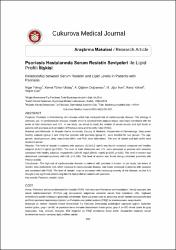Psoriasis Hastalarında Serum Resistin Seviyeleri ile Lipid Profili İlişkisi

View/
Date
2015Author
Yılmaz, NigarUlutaş, Kemal Türker
Doğramacı, A. Çiğdem
İnan, M. Uğur
Yüksel, Rana
Can, Yeşim
Metadata
Show full item recordAbstract
Amaç: Psöriasis, artmış kardiyovasküler hastalık (KVH) riski bulunan inflamatuar deri hastalığıdır. Henüz etyolojisi tam olarak belirlenememiştir. KVH'da yağ dokusundan salgılanan resistinin serum total kolesterol, LDL, trigliserid seviyeleriyle pozitif korelasyon gösterdiği belirtilmiştir. Bizim çalışmamızda da amacımız serum resistin seviyeleriyle lipid profilinin psoriasis hastalarında ilişkisini ve Psöriazis alan şiddet endeksi (PAŞİ) ile korelasyonunu araştırmaktır. Materyal ve Metod: Mustafa Kemal Üniversitesi Tıp Fakültesi Dermatoloji polikliniğine başvuran sağlıklı kişilerden kontrol grubu; grup I (n=34) ve psoriasis tanısı konulan hastalardan hasta grubu; grup II (n=37) olmak üzere iki grup oluşturuldu. Yaş, cinsiyet, tansiyon, BMI değerleri ve PAŞİ skorlaması tespit edildi. Gruplardan toplanan serum örneklerinde resistin seviyesi, lipid profiline bakıldı. Bulgular: Psoriasis hastalarını kontrol grubuyla kıyaslandığında serum resistin seviyeleri (grup I: 6,4±2,3 ng/ml; grup II: 12,3±3,0 ng/ml), total kolesterol (grup I: 167±31 mg/dl; grup II: 189±43 mg/dl), LDL seviyeleri (grup I: 90±21 mg/dl; grup II: 129±31 mg/dl) anlamlı olarak hastalarda yüksek tespit edildi (sırasıyla p=0.001; p<0,05; p=0,01). Serum resistin seviyesiyle LDL kolesterolün pozitif korelasyon gösterdiği saptandı (r=0,306). PAŞİ skorlamasının serum resistin seviyeleriyle güçlü pozitif korelasyon gösterdiği tespit edildi (r=0,669). Sonuç: Psoriasis hastalığında artan kardiyovasküler hastalık riskin olduğu bilinmektedir. Bizim çalışmamızda da kardiyovasküler hastalıkta arttığı tespit edilmiş resistin ve total kolesterol ve LDL seviyelerinin psoriasis hastalarında arttığı ve hastalığın şiddetini gösteren PAŞİ skorlamasıyla korele olduğu bulunmuştur. Hastalığın şiddetinin artmasıyla yükselmiş olabileceğini tespit ettiğimiz resistin seviyesinin psoriasis hastalarında lipid profili kadar çalışılmasının anlamlı olabileceği düşünülmektedir Purpose: Psoriasis is inflammatory skin disease which has increased risk of cardiovascular disease. The etiology is unknown, yet. In cardiovascular disease, resistin which is secreted from adipose tissue, was found correlated with the levels of total cholesterol and LDL. In our study, we aimed to study the relation of serum resistin and lipid levels in patients with psoriasis and correlation of Psoriasis Area and Severity Index (PASI). Material and Methods: In Mustafa Kemal University, Faculty of Medicine, Department of Dermatology, thirty-seven healthy subjects (group I) and thirty-four patients with psoriasis (group II) were enrolled for two groups. The age, gender, blood pressure, body mass index (BMI) and PASI were determined. The level of resistin and lipid profile were studied in serum. Results: The level of resistin in patients with psoriasis (12,3± 3,0 ng/ml) was found increased compared with healthy subjects (6,4± 2,3 ng/ml) (p=0.001). The level of total cholesterol and LDL were increased in patients with psoriasis compared with healthy subjects, respectively (189± 43 mg/dl; 129± 31 mg/dl) (p< 0,05; p=0,01). The level of resistin was determined correlated positively with LDL (r=0,306). The level of resistin was found strong correlated positively with PASI (r=0,669). Conclusion: The high risk of cardiovascular disease in patients with psoriasis is known. In our study, the levels of resistin, total cholesterol, LDL which increase in cardiovascular disease, was found increased in patients with psoriasis and correlated with PASI. The level of resistin may be increased with increasing severity of the disease, so that it is thought to be significant determining like the lipid profile in patients with psoriasis

















